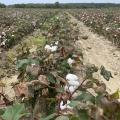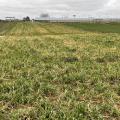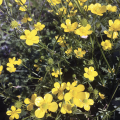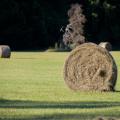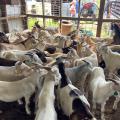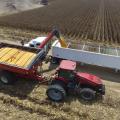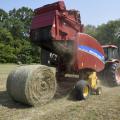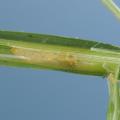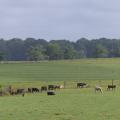News Filed Under Forages
This summer has not just felt hot and dry; close to half the state is in moderate to severe drought, and temperatures have been mostly in the 90s through all of August.
Mike Brown is the state climatologist and Mississippi State University professor of meteorology. He said much of the northern two-thirds of the state has been fluctuating between drought and being OK.
A Mississippi State University Extension Service forage specialist recently received a national award for his high-quality work and effective program development.
STARKVILLE, Miss. -- In less than half a year, Mississippi pastures have endured drought conditions and subfreezing temperatures, but landowners can soften the blow winterkill deals to their winter grazing systems.
Rocky Lemus, forage specialist with the Mississippi State University Extension Service, said moderated grazing, cover crop planting and adequate soil nutrition can keep winterkill in cool-season annual grasses from being widespread. Some forage loss is still to be expected.
Whether you have a large lawn, field, or pasture, you’ve probably had to deal with pesky weeds.
Mississippi hay growers harvested at least 28 percent less hay this year than usual because of the drought that reached extreme levels in parts of the state. Brett Rushing, Mississippi State University Extension forage agronomist, said hay producers in the state typically get three cuttings a year, and often four if they manage well and the weather cooperates.
LEAKESVILLE, Miss. -- Most goat meat sold in the U.S. is imported, but a group of Mississippi meat goat producers wants to see that change. A first-of-its-kind test in the state is underway to help them meet that goal. The Southeastern Buck Performance Test aims to improve the profitability of the meat goat industry in the region by improving meat goat genetics.
RAYMOND, Miss. -- Producers in Mississippi can provide feedback and input on the agricultural research and educational programs offered by Mississippi State University during the upcoming producer advisory council meetings. Hosted by MSU Extension Service and Mississippi Agricultural and Forestry Experiment Station personnel, the Producer Advisory Council meetings will be held in February. These meetings allow producers to learn about current research and educational opportunities, as well as to communicate their needs in these areas.
“Snow” appearing on the sides of highways and bare ground visible for miles is a sure indication that row crop harvest in Mississippi is well underway. As of early October, the majority of the 2022 crop was already harvested, although much work remains for certain crops.
STARKVILLE, Miss. -- Late summer and early fall are when many growers begin thinking about when to make their last cut of hay each year, but safety should always be the top priority of anyone operating a baler, whether it is May or October.
Regular equipment maintenance and inspections are the best ways to prevent hay baler fires, but disaster can sometimes happen regardless of good upkeep and storage practices.
Following last year’s significant fall armyworm outbreak, hay producers should be careful not to overlook another important pest -- the Bermudagrass stem maggot -- while watching for armyworms. While farm armyworms attack hay fields, home lawns, golf courses and more, the non-native Bermudagrass stem maggot is primarily a pest of hay fields.
CEDARBLUFF, Miss. – The Mississippi State University Extension Service invites producers to a field day highlighting stewardship in cattle grazing systems on June 23.
The Stewardship in Grazing Systems Field Day will be held at High Hope Farm in Cedarbluff from 8:30 a.m. to 1 p.m. The event will highlight conservation strategies that can be applied in small and diverse farm systems.
The Mississippi State University Extension Service invites beef cattle and hay producers to attend the Cool-Season Forage Field Day March 4 in Starkville.

